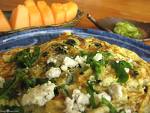
Aaahhh eggs, the misunderstood member of the nutrition family. Poor guys…when I graduated from college, in the height of the low cholesterol-low fat craze, we were indoctrinated to teach that"egg" was just another word for poison.
My how things have changed!
A couple of months ago I heard Dr. Susan Kleiner (www.goodmooddiet.com) speak at a conference. She shared that not once has there been a research study demonstrating that when you take eggs out of the diet, that this dietary change reduces cholesterol. As well, there has been research demonstrating that adding eggs (plus yolks) to the diet does NOT raise cholesterol. All those yolks I threw down the drain all those years…for nothing.
I figured I'd better find some hard research to back THAT one up, so here's a quick list of interesting titles I found in PubMed:
Dietary cholesterol from eggs increases plasma HDL cholesterol in
overweight men consuming a carbohydrate-restricted diet
Egg yolk improves lipid profile, lipid peroxidation and retinal abnormalities
in a murine model of genetic hypercholesterolemia.
There are many more, but here I just wanted to make my point. Egg yolks are not the ugly stepchild of the protein family anymore.
In fact, there are some great nutrients to be found in eggs.
1. Lutein and xeanthin are two carotenoid compounds that can help maintain visual health. One group of researchers reported that 6 eggs per week can help increase lutein and xeanthin levels in the macula, the part of the eye that degenerates in this country's leading cause of blindness, macular degeneration.
2. Eggs contain choline. This compound is very important for brain function. Choline is the building block for acetylcholine, the neurotransmitter involved in memory, and the one that many Alzheimer's medications seek to increase.
This compound is exceedingly hard to get in the diet. In fact, about the only two places you can find it, are egg yolks, and soy. (Well, also in cooked chicken, beef, veal, and turkey livers, but I didn't think that would have any of you running for your grocery lists so it goes in parentheses.)
If you've got PCOS, you've probably been told to avoid soy. So that leaves egg yolks for getting this very important memory booster.
3. If you hate fish but you need to increase your fish-based omega-3 intake, omega-3 eggs are a very cost-effective option. If you struggle to get enough vegetables in your diet, omelets and frittatas are great ways to get them in. Just be sure you use olive oil when you cook them.
I thought it might be timely to include eggs on this blog, because as food prices rise, they can certainly be much more cost-effective than salmon, as well as other proteins that are now taxing your grocery bill.
Mutungi G, Ratliff J, Puglisi M, Torres-Gonzalez M, Vaishnav U, Leite JO, Quann E, Volek JS, Fernandez ML. Dietary cholesterol from eggs increases plasma HDL cholesterol in overweight men consuming a carbohydrate-restricted diet. J Nutr. 2008 Feb;138(2):272-6.
Fernández-Robredo P, Rodríguez JA, Sádaba LM, Recalde S, García-Layana A.
Egg yolk improves lipid profile, lipid peroxidation and retinal abnormalities in a murine model of genetic hypercholesterolemia. J Nutr Biochem. 2008 Jan;19(1):40-8.
Wenzel AJ, Gerweck C, Barbato D, Nicolosi RJ, Handelman GJ, Curran-Celentano J. A 12-wk egg intervention increases serum zeaxanthin and macular pigment optical density in women. J Nutr. 2006 Oct;136(10):2568-73.
Goodrow EF, Wilson TA, Houde SC, Vishwanathan R, Scollin PA, Handelman G, Nicolosi RJ. Consumption of one egg per day increases serum lutein and zeaxanthin concentrations in older adults without altering serum lipid and lipoprotein cholesterol concentrations. J Nutr. 2006 Oct;136(10):2519-24.